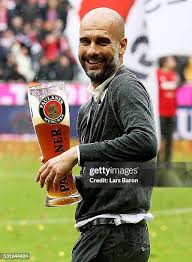
Introduction
Pep Guardiola is arguably one of the most influential managers in modern football. Known for his tactical acumen and innovative strategies, Guardiola has consistently transformed teams into formidable forces across Europe. With a coaching career that includes successful stints at Barcelona, Bayern Munich, and Manchester City, his approach to the game is not only about winning but also about redefining how football is played. Guardiola’s importance in the sport extends beyond tactics; it encompasses leadership, philosophy, and fostering talent.
Recent Achievements
As of October 2023, Pep Guardiola continues to make headlines with Manchester City. Under his guidance, the team secured an impressive treble last season, clinching the Premier League title, the FA Cup, and the UEFA Champions League. This historic achievement not only solidified Guardiola’s legacy but also underscored his ability to retain high performance and motivate his players over an exhausting season.
Furthermore, Guardiola’s tactical flexibility has been remarkable. He adapts his strategies based on opponents and game situations, switching formations and player roles effectively. This adaptability was particularly evident in key matches during the Champions League campaign, where Manchester City showcased a blend of possession-based football and effective counterattacks.
Innovative Tactics
Guardiola is renowned for his philosophy of “tiki-taka” – a style characterised by short passing and movement. His teams are trained to maintain possession while pressing opponents high up the pitch. This style not only aims to dominate games but also entertains fans worldwide.
Moreover, Guardiola’s emphasis on player development is pivotal. Many players have flourished under his management, including Kevin De Bruyne, Phil Foden, and Bernardo Silva. These players have not only enhanced their skills and tactical understanding but also contributed significantly to the team’s success. Guardiola’s ability to improve player performance is a testament to his expertise as a coach.
Conclusion
The legacy of Pep Guardiola in football is profound. His innovative tactics, combined with a strong emphasis on team cohesion and individual player development, have changed how the game is perceived. As we look to the future, it is likely that Guardiola will continue to shape football, not merely through his teams’ successes but also through the enduring influence of his coaching philosophy. Football enthusiasts and analysts alike will undoubtedly regard Guardiola as a pivotal figure in evolving the sport, setting benchmarks for aspiring coaches and players globally.
You may also like

Prestianni: Benfica’s Bright Future in Football

Stenhousemuir v Falkirk: A Crucial Clash in the League

Jack Willis: The Rising Star of English Rugby
SEARCH
LAST NEWS
- Remembering Wendy Richard: The Promise to Co-Star Natalie Cassidy
- How Did Anglian Water Achieve an ‘Essentials’ Rating for Mental Health Accessibility?
- Shai Hope Leads West Indies in T20 World Cup Clash Against South Africa
- What We Know About Weston McKennie: Future at Juventus and Past at Leeds
- What We Know About the Upcoming Live Nation Antitrust Trial